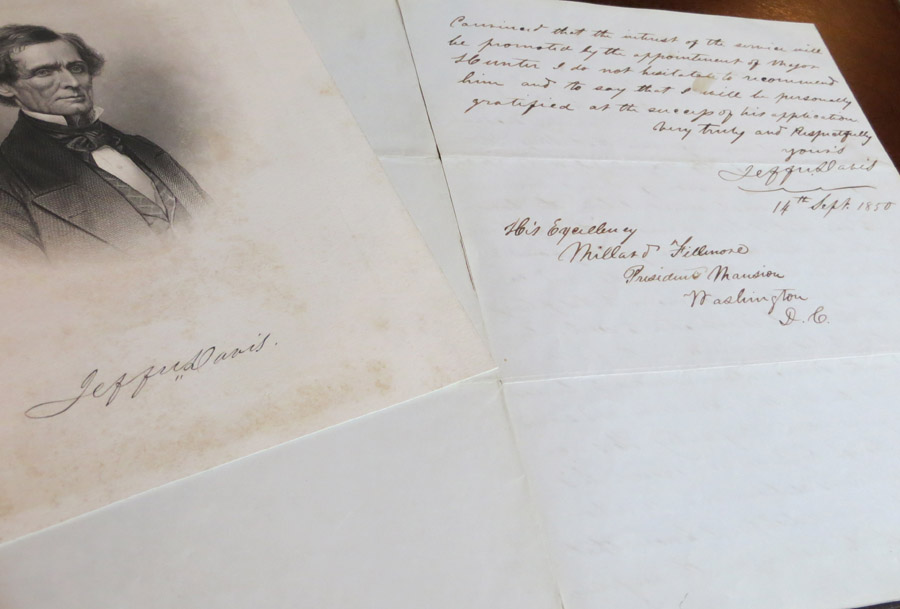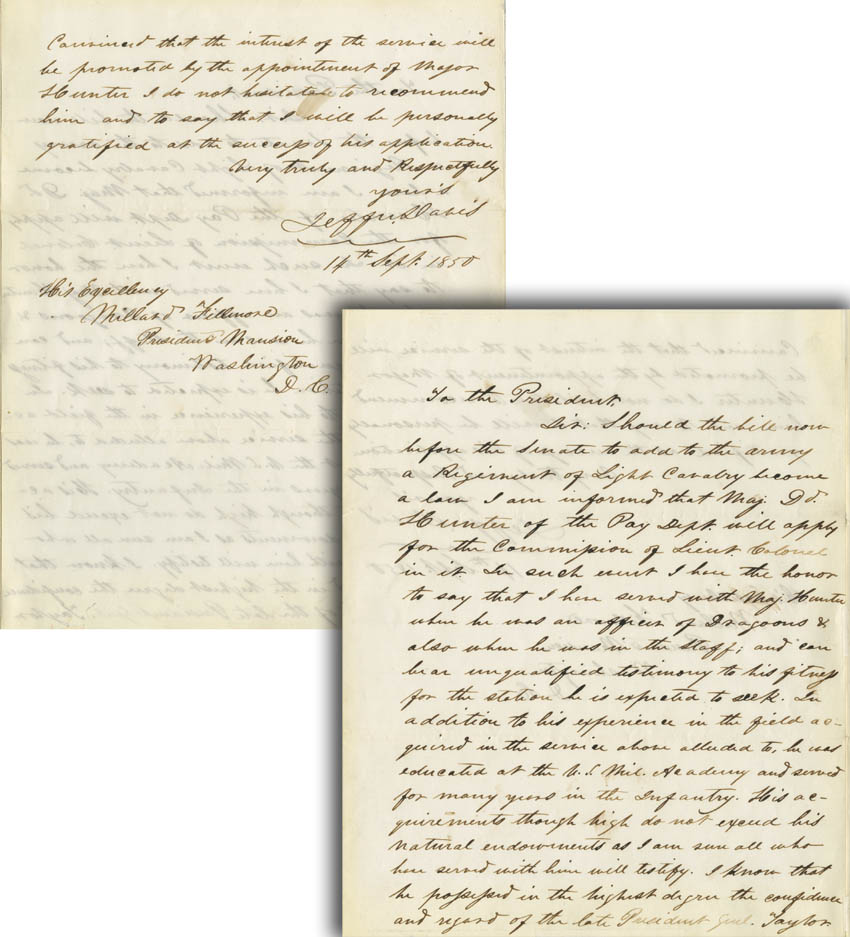Jefferson Davis Writes President Fillmore, Recommending for Promotion Future Major General David Hunter, On Whose Head He Would Later Place a Bounty
Promoted by Davis, Hunter would ravage the South, form the first unit of Black soldiers from the occupied south, and issued General Orders 11, freeing the slaves in 3 Southern states.
- Currency:
- USD
- GBP
- JPY
- EUR
- CNY
A country torn apart, brought home to Jefferson Davis; A rare letter from Davis to a sitting president; Ex-Sang Collection
David Hunter followed the course of many successful antebellum military careers. He went to West Point, served in the Mexican War with General Taylor, and received a recommendation for advancement...
A country torn apart, brought home to Jefferson Davis; A rare letter from Davis to a sitting president; Ex-Sang Collection
David Hunter followed the course of many successful antebellum military careers. He went to West Point, served in the Mexican War with General Taylor, and received a recommendation for advancement after success there. In 1850, he approached a military superior with whom he had served, Senator Jefferson Davis of Mississippi, to recommend him to fill a military position being created by Act of Congress. So did Senator Davis appeal directly to Fillmore, unknowingly beginning a long and distinguished career for future General Hunter that would end with him burning sections of the South and attempting to free the slaves in portions of the South.
Hunter was friends with Abraham Lincoln and corresponded with him on the subject of slavery and emancipation. Soon after the firing on Fort Sumter, Hunter was promoted to Colonel of the 3rd U.S. Cavalry, but three days later his political connection to the Lincoln administration bore fruit and he was appointed the fourth-ranking brigadier general of volunteers, commanding a brigade in the Department of Washington. He was wounded in the neck and cheek while commanding a division under Irvin McDowell at the First Battle of Bull Run in July 1861. In August he was promoted to Major General of volunteers, and was later appointed as commander of the Western Department on November 2, 1861, after John C. Frémont was famously relieved of command due to his attempt to emancipate the slaves of rebellious slave holders.
Hunter was a strong advocate of arming black soldiers for the Union cause. He began enlisting black soldiers from the occupied districts of South Carolina and formed the first such Union Army regiment, the 1st South Carolina (African Descent), which he was initially ordered to disband, but eventually got approval from Congress for his action. A second controversy was caused by his issuing an order emancipating the slaves in Georgia, South Carolina, and Florida. This was the controversial General Orders 11. This order would be rescinded, as Lincoln did want emancipation to be ordered by military commanders without his approval.
Jefferson Davis, the man who had helped launch Hunter’s career, issued orders to the Confederate Army that he was to be considered a “felon to be executed if captured.” In response to this, in a letter sent to Davis as the “titular” president of the Confederacy, Hunter wrote, “Mr. Davis, we have been acquainted intimately in the past. We have campaigned together, and our social relations have been such as to make each understand the other thoroughly. That you mean, if it ever be in your power, to execute the full rigor of your threat, I am well assured; and you will believe my assertion, that I thank you for having raised in connection with me and my acts this sharp and decisive issue. I shall proudly accept, if such be the chance of war, the martyrdom you menace; and herby give you notice that unless your General Order against me and my officers be formally revoked within thirty days from the date of the transmission of this letter, sent under a flag of truce, I shall take your action in the matter as final, and will reciprocate it by the hanging every Rebel officer who now is, or may hereafter be taken prisoner by the troops of the command to which I am about returning.”
This is Davis’s original recommendation for Hunter, on whom he would place a bountied death sentence. Moreover, it comes from the great Sang collection, from which the previous owner acquired this directly. Autograph Letter Signed, Washington, September 14, 1850, to President Millard Fillmore at the “Presidents Mansion.” “Sir, Should the bill now before Senate to add to the army a Regiment of Light Cavalry become a law I am informed that Maj. David Hunter of the Pay Dept. will apply for the Commission of Lieut. Colonel in it. In such event, I have the honor to say that I have served with Maj. Hunter when he was an officer of Dragoons and also when he was on the Staff; and can bear unqualified testimony to his fitness for the station he is expected to seek. In addition to his experience in the field acquired in the service above alluded to, he was educated at the US Mil. Academy and served for many years in the infantry. His acquirements though high do not exceed his natural endowments as I am sure all who have served with him will testify. I know that he possessed in the highest degree the confidence and regard of the late President Genl. Taylor. Convinced that the interest of the service will be promoted by the appointment of Major Hunter, I do not hesitate to recommend him and to say that I will be personally gratified at the success of his application. Very truly and respectfully yours, Jefferson Davis.” Presented in a double sided frame with images of Davis and Fillmore.
Hunter accompanied the body of Abraham Lincoln to Springfield and afterwards was invited by President Andrew Johnson to be a member of the nine-man military commission to try the Lincoln’s assassination conspirators.

Frame, Display, Preserve
Each frame is custom constructed, using only proper museum archival materials. This includes:The finest frames, tailored to match the document you have chosen. These can period style, antiqued, gilded, wood, etc. Fabric mats, including silk and satin, as well as museum mat board with hand painted bevels. Attachment of the document to the matting to ensure its protection. This "hinging" is done according to archival standards. Protective "glass," or Tru Vue Optium Acrylic glazing, which is shatter resistant, 99% UV protective, and anti-reflective. You benefit from our decades of experience in designing and creating beautiful, compelling, and protective framed historical documents.
Learn more about our Framing Services













































































































